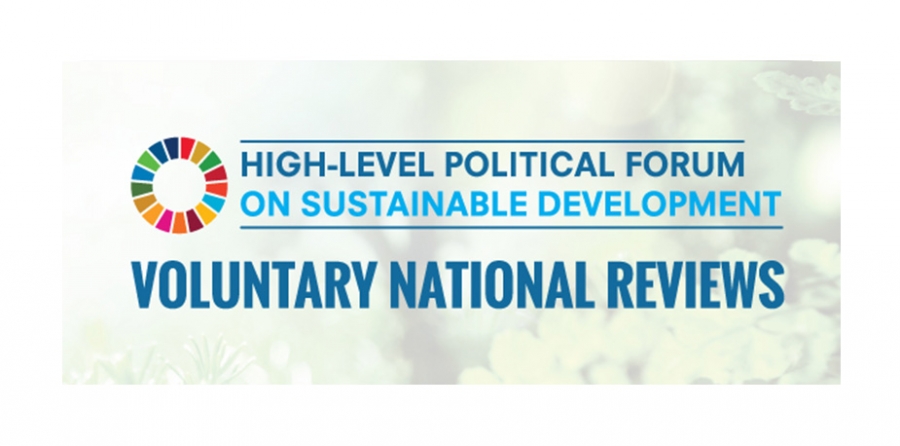 Indonesia asserts its commitment to implement the 2030 Agenda for Sustainable Development, also known as the Sustainable Development Goals (SDGs). As part of this commitment, Indonesia has submitted its first Voluntary National Reviews (VNR) in 2017. Since then, Indonesia has reassessed its national policies and agendas and once again submits its VNR in 2019.
Indonesia asserts its commitment to implement the 2030 Agenda for Sustainable Development, also known as the Sustainable Development Goals (SDGs). As part of this commitment, Indonesia has submitted its first Voluntary National Reviews (VNR) in 2017. Since then, Indonesia has reassessed its national policies and agendas and once again submits its VNR in 2019.
The implementation of SD Gs has been the priority ever since the SDGs being adopted as a global agenda at United Nations General Assembly in New York, September 2015. Indonesia’s national development agenda has been aligned with the 17 goals and 94 out of 169 measurable targets of SDGs. This is especially true in President Joko Widodo first term of presidency (2015-2019) whereby “Nawacita” (literally, the nine visions) was chosen as the national development vision. Furthermore, the agenda has also been integrated in development policies, strategies and programs of National Medium-Term Development Plan (RPJMN), and translated into Government Work Plan (RKP) with its associated budget. The integration of SDGs into development plan is also implemented in subnational level reflected in the Medium-Term Regional Development Plan (RPJMD) and Regional Work Plan (RKPD).
The SDGs implementation is conducted by involving all stakeholders: government and parliament, philanthropic and business societies, civil society organizations and media, as well as academics and experts to ensure achieving SDGs in line with the principles of inclusiveness and no one left behind. There are some documents prepared for SDGs implementation, among others: Presidential Regulation and Minister for National Development Planning’s Regulation as the legal basis, technical guidelines to develop action plan, rnetadata of SD Gs’ indicators, communication strategy, and SDGs dissemination to al1 stakeholders, all of which at national and sub-national levels.
This review contains highlights of Indonesia’s achievements in implementing SDGs. This VNR specifically focuses on 6 priority goals, namely Goal 4, 8, 10, 13, 15, and 17. Furthermore, Indonesia also reports the progress of the rest of the goals. For the past two years, lessons learned in the 2017 VNR serve as a reference to improve the effectiveness and efficiency of Indonesia’s national and subnational policies. The data used in this report is mainly from Statistics Indonesia and relevant ministries and agencies.
The production of this report was coordinated by Ministry of National Development Planning/National Development Planning Agency and supported by the Ministry of Foreign Affairs. Highest appreciation and gratitude are extended to all members of the National Coordination Team for SDGs Implementation for their hard work and contributions.
The appreciation and gratitude are especially conveyed to:
- Deputy for Maritime and Natural Resources Affairs of Ministry of National Development Planning as the Chair of SDGs National Implementing Team and Person In Charge for Environment Development Pillar; Deputy for Human Development and Development of the Community and Culture of Ministry of National Development Planning as the Vice Chair I of SD Gs National Implementing Team and Person In Charge for Social Development Pillar; Deputy for Economic Affairs of Ministry of National Development Planning as the Vice Chair II of SDGs National Implementing Team and Person In Charge for Economic Development Pillar; Deputy for Political Affairs, Law, Defence and Security of National Development Planning as the Vice Chair III of SDGs National Implementing Team and Person In Charge for Justice and Governance Development Pillar; Senior Advisor of the Minister of National Development Planning/Head of National Development Planning Agency for Equity and Regional Development as Head of Working Group of the Environment Development Pillar; and Senior Advisor of the Minister of National Development Planning/Head of National Development Planning Agency for Institutional Interrelations as Head of Working Group of the Justice and Governance Development Pillar.
- Senior Advisor of the Minister of National Development Planning/Head of National Development Planning Agency for Synergy of Economic Affairs and Financing as Head of Secretariat of SDGs, who organized the VNR development and finalization.
- Directors under the Ministry of National Development Planning/National Development Planning Agency as the coordinators for formulating each of the Goal namely Amich Alhumami, MA, M.Ed, Ph.D, Director for Education and Religious Affairs; Dr. Hadiat, MA, Director for Higher Education, Technological, Science and Culture; Dr. Vivi Yulaswati, M.Sc, Director for Poverty Reduction and Social Welfare; Ir. R. Anang Noegroho Setyo Moeljono, M.E.M, Director for Food and Agriculture Affairs; Pungkas Bahjuri Ali, STP, MS, Ph.D, Director for Community Health and Nutrition; Woro Srihastuti Sulistyaningrum, ST, MIDS, Director for Family, Women, Children, Youth and Sport; Ir. Josaphat Rizal Primana, MSc, Director for Energy, Mineral and Mining Resources; Dr. Ir. Rachmat Mandiana, MA, Director for Energy, Telecommunication and Informatics; Mahatmi Parwitasari Saronto, ST, MSIE, Director for Manpower and Expansion of Employment Opportunities; Dr. Muhammad Cholifihani, SE, MA, Director for Financial Services and State-Owned Enterprises; Ir. Ahmad Darling Gunadi, MA, Director for Development of Small and Medium Enterprises and Cooperatives; Leonardo Adypurnama Alias Teguh Sambodo, SP, MS, Ph.D, Director for Industry, Tourism and Creative Economy; lkhwan Hakim, ST, MSc, Ph.D, Director for Transportation; Maliki, ST, MSIE, Ph.D, Director for Planning, Population and Social Security; Dr. Velix Vernando Wanggai, SIP, MPA, Director for Disadvantages Regions, Transmigration and Rural Development; Ir. Medrilzam, M.Prof.Econ, Ph.D, Director for the Environment; Dr. Ir. Sri Yanti JS, MPM, Director for Marine Affairs and Fisheries; Dr. Nur Hygiawati Rahayu, ST, MSc, Director for Forestry and Conservation of Water Resources; Tri Dewi Virgiyanti, ST, MEM, Director for Development of Urban, Housing, and Settlement Areas; Drs. Wariki Sutikno, MCP, Director for Political and Communication Development; Prahesti Pandanwangi, SH, Sp.N, LL.M, Director for Laws and Regulations; Ir. Wisnu Utomo, M.Sc, Director for Foreign Policy and International Development Cooperation; Tatang Muttaqin, S.Sos., M.Ed., Ph.D, Director for the State Apparatus; RM Dewo Broto Joko P, SH, LLM, Director for Defense and Security; Ir. Boediastoeti Ontowirjo, MBA, Director for State Finance and Monetary Analysis; Dr. Ir. Yahya Rachman Hidayat,MSc, Director for Trade, Investment, and International Economic Cooperation; Drs. Sri Bagus Guritno, Ak, MSc, CA, Director for GovernmentPrivate Partnership and Engineering Design; and Eka Chandra Buana, SE, MA, Director for Macro Planning and Statistical Analysis.
- Coordinating Ministry of Human Development and Culture; Coordinating Ministry of Economic Affairs; Coordinating Ministry of Maritime Affairs; Coordinating Ministry of Politics, Law and Security; Ministry of Foreign Affairs; Ministry of Social Affairs; Ministry of Health, Ministry of Agriculture; Ministry of Education and Culture; Ministry of Research, Technology and Higher Education; Ministry of Women Empowerment and Child Protection; BPS-Statistics Indonesia; Ministry of Energy and Mineral Resources; Ministry of Manpower; Ministry of Tourism; Ministry of Cooperatives, Small and Medium Enterprises; Ministry of Industry; Ministry of Public Works and Public Housing; Ministry of Village, Development of Underdeveloped Regions and Transmigration; Ministry of Communication and Informatics; Ministry of State Owned Enterprises; Ministry of Environment and Forestry; National Disaster Management Authority; Ministry of Marine Affairs and Fisheries; Meteorological, Climatological, and Geophysical Agency; National Commission on the Elimination of Violence against Women; Ministry of Law and Human Rights; Ministry of Administrative and Bureaucratic Reform; Ministry of Finance; Ministry of Trade; National Public Procurement Agency; Bank Indonesia; Secretariat of Desk Papua, Ministry of National Development Planning/Bappenas; Secretariat of Indonesia Climate Change Trust Fund (ICCTF), and Secretariat of Indonesia Green House Gas Emission.
- Representatives of civil society organizations: PP Muhammadiyah, PB Nahdatul Ulama Indonesia Teaches (Indonesia Mengajar), Ruangguru, Innovation for Indonesia’s School Children (/novasi untuk Anak Sekolah Jndonesia/INOVASI), OHANA (Organisasi Harapan Nusantara) Indonesia; Migrant Care; CARE International Indonesia (Cll); Yayasan KARINA; Partner for Resilience Indonesia; Red Cross Climate Center; National Platform for Disaster Risk Reduction; Indonesian Society for Disaster Management; Partnership for Governance Reform; Joint Committee for Leaded Gasoline Phaseout; International Federation of Red Cross Partners for Resilience; Nature Indonesia; Peat Lands Partners Fund Indonesia; TERANGI Foundation; Aliansi Remaja Independen; Prakarsa Borneo; PKTA Alliance; Wahana Visi Indonesia; Indonesia untuk Kemanusiaan (IKa); Indonesia Planned Parenthood Association (PKBI); Indonesia for Global Justice (IGJ); 2030 Youth Force Indonesia; Perkumpulan Prakarsa; KSBSI (Konfederasi Serikat Buruh Sejahtera Indonesia); Pusat Transformasi Kebijakan Publik; Kapa! Perempuan and Cakra Wikara Indonesia;
- Representatives of philanthropy and business society: Tanoto Foundation, BAZNAS (Badan Amil Zakat Nasional); The Indonesia Business Council for Sustainable Development (IBCSD), Indonesia Global Compact Network (IGCN); Astra Honda Motor (AHM); Indonesian Chamber of Commerce and Industry (KADIN); Indonesian Philanthropy Association (FI); and PT. Vale Indonesia.
- Academics and experts of SDGs Center, Padjajaran University; University of Indonesia; Lembaga Demografi, University of Indonesia; Center on Child Protection and Wellbeing (PUSKAPA), University of Indonesia; Center for Strategic and International Studies (CSIS); and The SMERU Research Institute.
- Indonesia development partners including Office of the United Nations Resident Coordinator (UNRC); United Nations Development Programme (UNDP); United Nations Children’s Fund (UNICEF); United Nations Educational, Scientific and Cultural Organization (UNESCO); Food and Agriculture Organization (FAO); International Labour Organization (ILO); Deutsche Gesellschaft fur Internationale Zusammenarbeit (GlZ) Indonesia; and Department of Foreign Affairs and Trade of Australia (DFAT).
- Other parties that contributed valuable inputs to Indonesia 2019 VNR both through online and offline public consultations.
- Finally, SDGs Secretariat at the Ministry of National Development Planning/National Development Planning Agency that has been persistently dedicated to tireless efforts to coordinate and finalize the formulation of 2019 VNR.

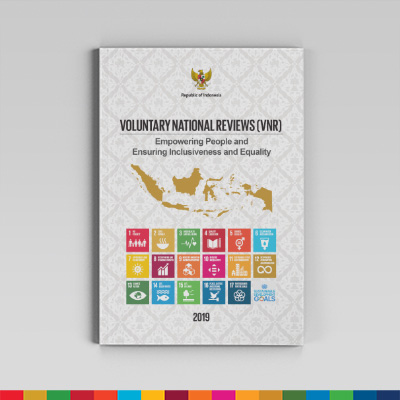
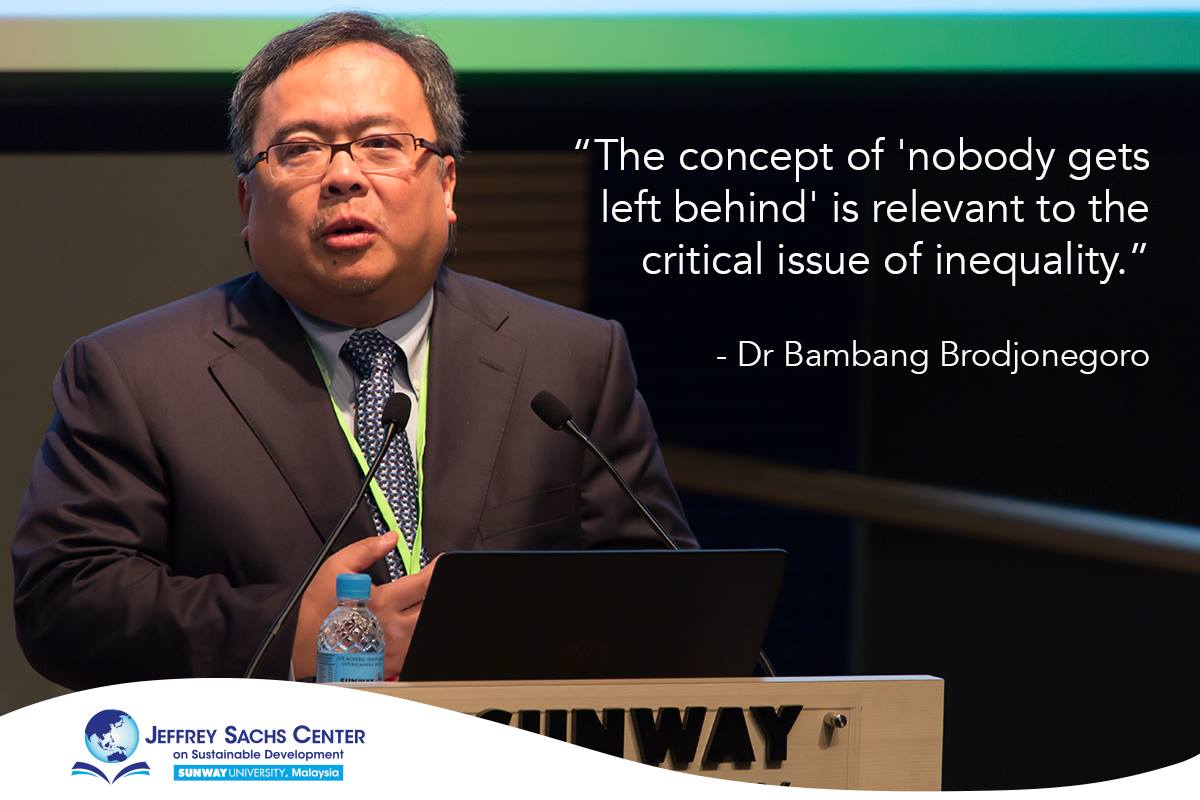 The fulfilment of SDGs has always been a development priority for the Government of Indonesia. By constitutional mandate, Indonesia is obliged to advance public welfare and to improve the quality of life for all Indonesian citizens. The Pancasila (five pillars) as Indonesia’s ideology also emphasizes the importance of social justice for all citizens. Consequently, the SDGs have been mainstreamed into the national development agenda and the Indonesia’s Vision 2045. Nevertheless, Indonesia believes that the 2030 agenda for Sustainable Development Goals will not be achieved without multilateral cooperation. issues of quality of education, employment, inequality, climate change, peace and justice as well as inclusive cooperation are common global challenges that require a multi-stakeholder approach, which includes the exchange of best practices.
The fulfilment of SDGs has always been a development priority for the Government of Indonesia. By constitutional mandate, Indonesia is obliged to advance public welfare and to improve the quality of life for all Indonesian citizens. The Pancasila (five pillars) as Indonesia’s ideology also emphasizes the importance of social justice for all citizens. Consequently, the SDGs have been mainstreamed into the national development agenda and the Indonesia’s Vision 2045. Nevertheless, Indonesia believes that the 2030 agenda for Sustainable Development Goals will not be achieved without multilateral cooperation. issues of quality of education, employment, inequality, climate change, peace and justice as well as inclusive cooperation are common global challenges that require a multi-stakeholder approach, which includes the exchange of best practices.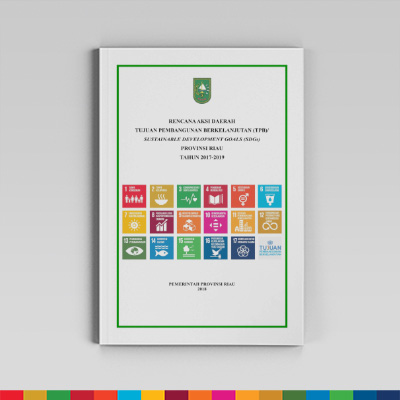
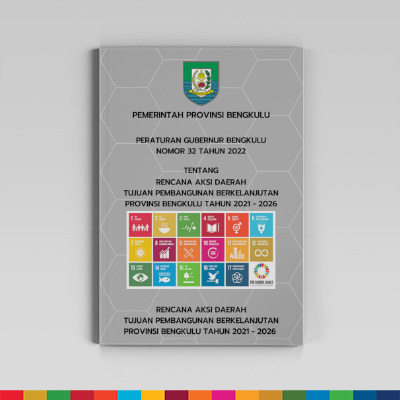
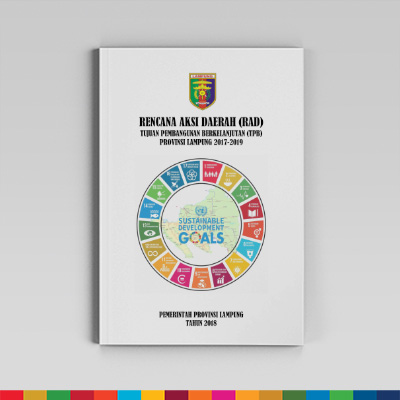
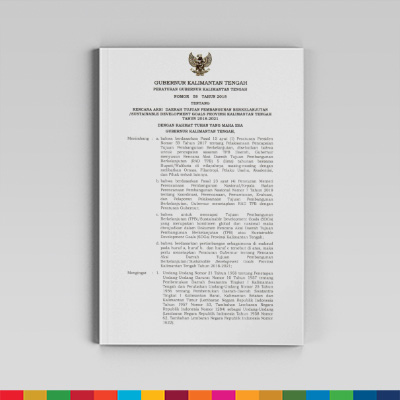
Reviews
There are no reviews yet.